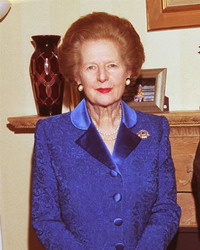Login form
Margaret Thatcher
 Styled as 'The Iron Lady' for her tough demeanour, Margaret Thatcher was the first woman to become British Prime Minister and is one of only two Prime Ministers of the 20th Century to have served three consecutive terms. She was elected leader of the Conservative party in 1975, but it wasn't until 1979 that she became Prime Minister (and subsequently won the 1983 and 1987 general elections).
Styled as 'The Iron Lady' for her tough demeanour, Margaret Thatcher was the first woman to become British Prime Minister and is one of only two Prime Ministers of the 20th Century to have served three consecutive terms. She was elected leader of the Conservative party in 1975, but it wasn't until 1979 that she became Prime Minister (and subsequently won the 1983 and 1987 general elections).
Fact File
Margaret Hilda Roberts was born in Grantham, Lincolnshire, in 1925, to a grocer. She read Chemistry at Oxford, and later qualified as a Tax Lawyer.
She entered politics and under Edward Heath (then Prime Minister) was Minister for Education and Science for four years, before successfully challenging him for the leadership of the Conservative Party in 1975 - an event that would be spookily recreated in her own demise.
In 1982 she sent a task force to oust invasionary Argentinian forces from the Falkland Islands. Some attribute the peak of her success to the subsequent victory.
She survived the bombing of the Grand Hotel in Brighton in 1984, which took place during the Conservative Party Conference. IRA terrorists were responsible for the blast in which several people were killed and numerous were injured.
She resigned after a challenge to the party leadership in November, 1990, after failing to achieve a majority, though she clearly won the first round. Many critics at the time made parallels with Edward Heath's resignation.
She remained an MP for another two years, trying to 'pull the reigns' from the back benches before retiring to the House of Lords as Baroness of Keveston. Instead of retiring from the stage, Baroness Thatcher is still waiting in the wings and has garnered a similar reputation as Prince Philip for her ability to say the wrong thing at the wrong time.
Outro
Margaret Thatcher went from being one of the most popular Prime Ministers ever to being one of the most loathed. Even though, some would say that in the late '70s her policies laid the groundwork for a massive boom in the British economy, cutting taxes and financing the yuppie generation.
However, under her leadership, many Britain's nationalised industries were sold, coal mining in the UK was destroyed, unemployment more than doubled, the trade unions were broken and Britain was led into its biggest recession since the 1960s.
She also introduced the Poll Tax which led to widespread rioting, particularly in London. Thousands refused to pay it: leading to hundreds, including a few protesting celebrities, being fined or jailed.

